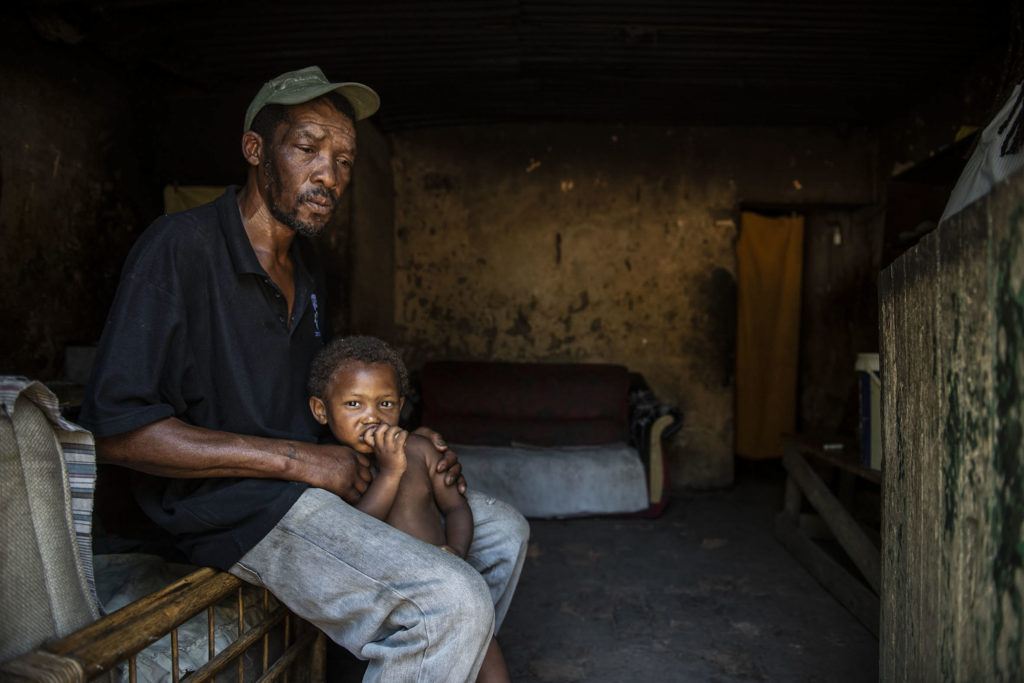Dreamless living: The farm where Alfred Witbooi has worked and lived for more than a decade offers broken, roofless toilets and dire living quarters. He wants a better home for his young children, with drinking water in the taps. (David Harrison/M&G)
Farmworker rights groups are calling for the government to expropriate land from farmers if labourer accommodation is not up to scratch.
The Ubuntu Rural Women and Youth Movement in the Western Cape says some farms along the foothills of the Simonsig Mountains in the Franschhoek Valley are shirking their responsibility to maintain the housing of farm labourers and dwellers.
The Mail & Guardian visited one of these farms, with about 25 structures meant for housing. Some were bricked up to stop people occupying them. Others are missing windows, whereas gaping holes in roofs offer no protection from the weather. There were almost no toilet facilities.
Alfred Witbooi, a 49-year-old farmworker who has lived and worked on the farm for more than a decade, says he has asked that he and the five members of his family be accommodated in better living conditions.
He hasn’t heard from the farm’s management.
At the very least, he wants drinkable water made available in his home — a basic service that he isn’t getting. “We don’t have clean water coming here. This water comes from an open dam via a pipe to where we are living. I know, because I work at that dam. That water stinks, and then it comes here. We have to cook food with this smelly water.”
Witbooi says life as a farm labourer is hard. He says he was born into the work, following his parents’ footsteps and he expects to stay in poverty. But he wants this to change for his children:“I don’t have any dreams for me, but I have for my children. I want to leave something behind for them. In my current circumstances, I can’t leave anything for them. The only thing they’ll have one day is an old man, dead in a box. They’ll have nothing else. Not even a few hundred rand left behind for them by me,” he says.
Lena Arrison and her husband worked on the farm for more than 30 years, but when she retired it was without much in the way of recognition for that time. “When I retired, I got nothing, except for my last paycheck and my UIF [Unemployment Insurance Fund]. Retirement contributions were never deducted from our salaries, only UIF.”
 Alfred Witbooi. (David Harrison/M&G)
Alfred Witbooi. (David Harrison/M&G)
The one thing she does have, however, is a modest, rent-free farmhouse.
But, she is upset in the way it has been allowed to deteriorate, not through her family’s fault, but she says through lack of maintenance by the farm owner.
“This house we’re living in has been here for more than 30 years. Inside we do what we can do to maintain it and keep it clean. But the building belongs to the farm owner, so we can’t do anything to the outside. We’ve done what we can,” she says sitting in her front yard among chickens and grapevines.
“Most of the houses here are in a bad state. Roofs leak, they have cracked walls. It is falling apart. It is high time the government gets involved so that farmworkers and people in farm communities can get decent housing,” she adds.
She also worries that when they die, their children will be evicted. The contract that they signed with the farm owner states that when she and her husband are gone, her children and grandchildren will have no rights to the house.
“We don’t know for how long we are going to be here. So we don’t know if we must invest time and money into making things right here. It’s worrying me. I’ve told them to go register at the municipal housing office. But I don’t know how long that is going to take,” Arrison says.
The Ubuntu Rural Women and Youth Movement’s Wendy Pekeur says she is petitioning government departments and state entities — such as the Human Rights Commission, the human settlements department, and the rural development department — to be more proactive in monitoring conditions on farms.
“These conditions here where Mrs Arrison and Mr Witbooi live are appalling. It is inhumane, people can’t live lives of dignity here. The Constitution guarantees us the right to dignity. If I were to compare it to other farmworker dwellings, this is some of the worst I’ve seen,” she says.
Pekeur says government must consider expropriating the land where farmworker’s accommodation is located if farm owners are not ensuring the homes are maintained and looked after.
“Many of these dwellings are on private property, so municipalities can’t intervene with basic services. If that is the case then government must expropriate land the dwellings are built on and make life decent for people,” she says.
Pekeur adds that farm owners are using benign neglect tactics to get people off their property. “You get illegal eviction and then you get constructive eviction, where you are essentially forced to leave the farm. By not providing services, by not providing water, it is as good as illegal eviction.”
She believes stricter government policy on evictions is needed to protect farmworkers and dwellers. Although some farm owners have implemented progressive policies on housing and working conditions, others have not, leading to the entire agri-industry being shamed.
Pekeur believes that large farms, owned by some of South Africa’s wealthiest families and business people, should be setting the tone and influencing other farm owners to better their conditions.